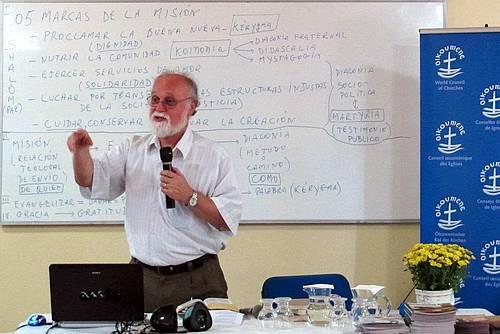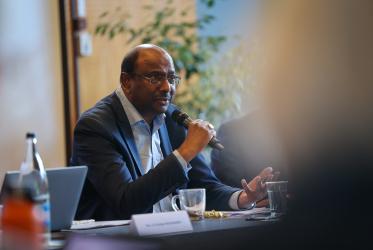More than forty participants from diverse Christian backgrounds gathered in Brazil, coming from several Latin American countries sought dynamic ways of ecumenical formation of diaconal work at a “Latin American Formation Seminar on Diakonia” which took place from 21-24 November.
The meeting was promoted by the World Council of Churches (WCC) and organized by the Latin American Council of Churches (CLAI) at the Escola Superior de Teologia (EST) in São Leopoldo.
The event brought together theologians, church leaders, teachers, students, as well as people who develop diaconal work in various capacities. Together, they discussed sharing of training curricula and reflected on the theological dimensions of “prophetic diakonia”, with special attention to its role in the public policy.
The WCC has a history of working on diaconal ministry which comprises of more than 60 years. After the 9th Assembly in Porto Alegre, in 2006, international consultations on the subject were held in May 2009 in Bucharest, Romania, and in December 2010 in Utrecht, the Netherlands.
This was the first meeting in a series of regional training seminars on capacity building for diakonia which are being organized by the WCC together with the regional ecumenical organizations from around the world.
The methodological process of the seminar was facilitated by the Regional Centre Ecumenical Asesoría y Servicio (CREAS), which is based in Buenos Aires, Argentina.
On the first day of the seminar, participants reflected on the theme “diakonia and mission”, presented by Rev. Carlos Emilio Ham, WCC programme executive for Latin America.
Ham highlighted that Missio Dei (God’s Mission) is holistic and implies sharing the good news of the gospel of Jesus Christ through words, action, liturgy, witness and communion. “Therefore we are pursuing God’s mission when we comfort the people in need and when we confront the unjust structures in society,” he said.
Another main theme in the first day was “diakonia and theology”, facilitated by professor Rodolfo Gaede Neto, who shared an expressive approach which applies to the contextual dimensions of this subject in Brazil.
He noted that Afro-Brazilians represent about half the population in the country and are characterized by suffering historically, which involves socio-economic exclusion as well as ethnic, cultural and gender based discrimination.
Neto also stressed the importance of contextualizing diakonia in Latin America, considering the poorest among the poor, those living in discriminated communities due to ethnical, cultural, religious and economic reasons, and providing a table with bread and communion.
According to David Cela Heffel, member of the diakonia project desk, and responsible for ecumenical relations at the Evangelical Church of the River Plate, this seminar addressed crucial themes.
He noted that several universities in Latin America discuss the issue of diakonia separately, and each church addresses the issue in even more distinct ways. For instance, some churches take diakonia as an ordained ministry, while others don’t.
“The red line among all of our experiences is our understanding that diakonia is an essential part of being a church in Latin America,” said Heffel. “Here we are uniting our voices and starting to think of diakonia for the future,” he concluded.
The conference continued with exchanges of experiences, visits to local projects, reflections on cross-cutting themes and discussions on financial viability and sustainability; all are important elements of training for diaconal work.
Read also:
Read the article on “Diakonia” from Dictionary of the Ecumenical Movement







